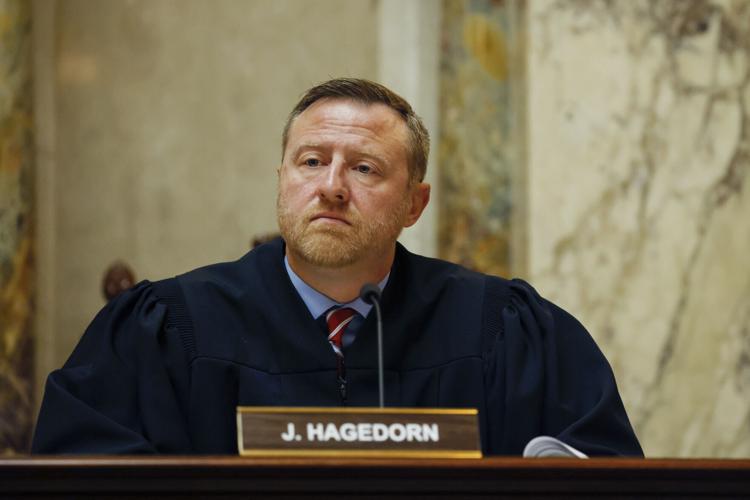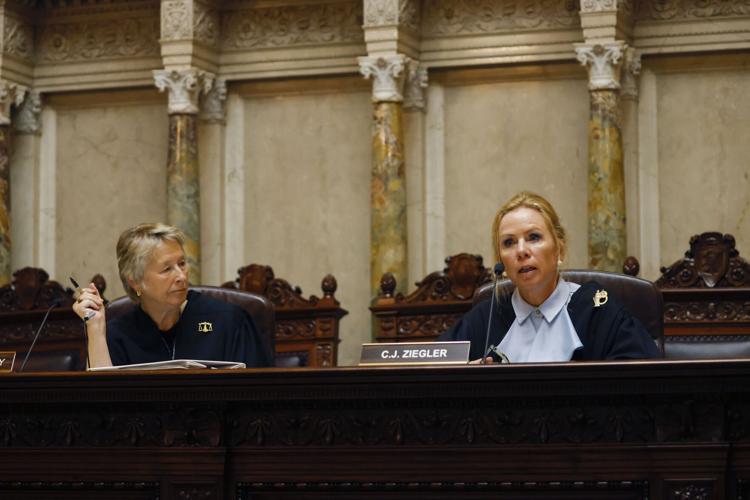Wisconsin’s high court, despite fierce infighting between liberal and conservative justices and the threat of potential impeachment of its newest member, conducted a public hearing Thursday to consider scrubbing people’s eviction records after one year instead of 20 years.
Legal Action of Wisconsin, a nonprofit that provides free legal services to low-income people, asked the state Supreme Court in March 2022 to change court rules, dictating policy for all courts in the state, to help “more Wisconsin families find and maintain safe and affordable rental housing.” Legal Action requested a similar change in 2021 that was not adopted because then-Director of State Courts Randy Koschnick determined a new record-retention policy would be too burdensome to implement.
Landlords use eviction-related records as a reference when determining whether to rent to applicants. Legal Action attorney Carmen Ayers said, in reality, the records act as an unfair barrier to some tenants.
“There are two sides and you're giving more liberty to a landlord than you give to a tenant,” Ayers said. “We believe the records just shouldn't exist, but we also realize that this is a reality that we cannot request. It's the court's obligation to somehow use its power for good and, in this case, we believe that that is scrubbing these records.”
“We're talking about human decency here, as well as court process,” Ayers added. “Individuals are just trying to access housing, which is a basic human right, and this will be impactful.”
New Justice Janet Protasiewicz, who shifted the majority on the state Supreme Court to the left for the first time in 15 years, took the bench for her first time Thursday amid threats from state Republican lawmakers that they might vote to impeach her if she rules on cases involving Wisconsin’s legislative district maps, which she had called “rigged” during her campaign for the court.
Protasiewicz’s comments about gerrymandered maps, plus liberal justices’ move to fire and replace state courts director Koschnick and to reduce the administrative powers of conservative Chief Justice Annette Ziegler, have set off a firestorm between the Supreme Court factions.
But the high court justices appeared cordial Thursday in the state Capitol hearing room as they questioned attorneys and listened to two hours of testimony advocating both for and against granting the rule change.
Eviction records follow ‘normal’ tenants
Under current court rules, most small claims records are retained by courts for 20 years after a case concludes. In some instances, records are retained for only two years. However, few eviction cases fall into that category, so records are retained regardless of whether an eviction was granted. Many landlords can access these records online, for free, using the Wisconsin Court System website, or CCAP.
Once someone has an eviction on their record, there's not a lot that can be done to remove the record, according to Madison’s Tenant Resource Center.
“Here's a pretty typical scenario we see here at the TRC: A tenant has been living in a rental for a while and is a normal tenant — not excessively good or bad. (The) tenant is trying to move, and suddenly he's being denied housing due to an unknown eviction hearing that's on his record from last year,” the center’s website says. “He comes into our office, wondering what he can do…Probably not a whole heck of a lot.”
Grace Kube, the director of the Eviction Defense Clinic at the University of Wisconsin Law School, has seen this situation firsthand hundreds of times, she told the court Thursday.
“The stories we heard over and over and over again were varying degrees of, ‘I got the five-day notice and I vacated. I had no idea this was on my record,’” Kube said. “It is, ‘I got evicted one time because I had an emergency expense for my child. I've had a perfect rental history since and this 8-year-old record is still impeding me from finding housing.’”
Greg Jones, the first vice president of the Wisconsin NAACP and president of the local Dane County branch, said the change would be a significant step for the state to protect the most vulnerable populations.
But attorney Heiner Giese, who represents three landlord and property owner advocacy groups — the Rental Property Association of Wisconsin, the Wisconsin Apartment Association and the Wisconsin Realtors Association — argued otherwise. The change would hurt tenants more than it would help, he said.
‘That’s going to hurt tenants … small landlords’
“Landlords, knowing that they won't have good access to somebody's past business record, are going to have to raise the security deposit, double it perhaps to be sure they're going to get their rent paid,” Giese said. “They're going to have to engage in a tighter screening for those tenants. That’s going to hurt tenants, especially tenants who have never been evicted. It’s also going to hurt the small landlords.”
Justice Brian Hagedorn raised concerns about the rule change, saying taking such action increases secrecy and prefers one group of people over another.

Wisconsin Supreme Court Justice Brian Hagedorn said Thompson’s retirement is “a real loss for Wisconsin.”
“It just feels to me like you're making a really dramatic policy argument that is asking us to favor certain folks over others and proposing to hide information from the public, including those who would have a pretty reasonable interest in that information when making business decisions,” Hagedorn said.
Korey Lundin, a staff attorney with Legal Action of Wisconsin, said the change would address structural inequities.
“What makes eviction records different from other court records, including criminal records, is that they impact a basic human need of having shelter, having a roof over your head. No other court records impact that basic human need in the way eviction records do,” Lundin said. “We're only asking that the state not be the one to put this information out there. There are plenty of private market solutions to this that landlords have come up with.”
Hagedorn furthered that taking information away that's freely available allows private-sector companies to “charge more to the renters on the front end.”
Asked by the justices if she believes that to be true, Kube of the UW Law School said she doesn’t “buy it.”
“Landlords are not changing their requirements, they’re not requiring double security deposits,” Kube said. “Tenants are already being harmed, tenants who have done nothing wrong. The idea that this will harm tenants — that’s already happening.”
Lundin echoed a similar sentiment.
“I reject the notion that adopting this will harm renters,” Lundin said, “and if the court believes there would be some harm, it would be far outweighed by the harm of keeping eviction records for 20 years.”
Other attorneys representing landlords or property management testified that their clients meet with residents with evictions to find an arrangement. Kube didn’t believe that, either.
“In my experience, although we've heard there are some landlords willing to hear out a client, almost none of them are actually doing that,” she said. “In these big counties like Dane and Milwaukee, there is a form you fill out where you check a box if you've been evicted or not, and that is the end of the story.”

Justice Ann Walsh Bradley and Chief Justice Annette Kingsland Ziegler attend a public hearing in the Wisconsin Supreme Court at the Capitol building in Madison on Thursday, Sep. 7, 2023.
Dane County clerk worries about impact of change
Delays and the burden to implement the rule change remained a concern at Thursday’s hearing. Carlos Esqueda, Dane County clerk of circuit court, said it would turn into “an administrative issue” due to the amount of time it will take to seal off records in the system.
“I believe that the number of such motions (to seal) will only increase over time, and I predict by a lot,” Esqueda said. “I'm speaking as the recordkeeper who will have to actually do the work that results from these sealing and redaction motions. We had 1,700 eviction cases (in Dane County) filed so far this year. I wouldn't be surprised if the vast majority of those wound up having sealing and redaction motions filed on them.”
Esqueda said the only way to complete the rule change would be to consider “the nuclear option”: taking down CCAP altogether.
“As long as we have the website and it's as open as it is, and I like the fact that these records are available, it creates these problems that bring advocacy groups before you to talk about issues like this one,” Esqueda said.
Ayers, the attorney with Legal Action of Wisconsin, said the group was willing to find a compromise.
“We understand that (records) destruction is costly and timely and that we're understaffed, so we want to be realistic,” Ayers said. “We also believe that there should be a balancing test and when it ultimately comes down to it, we look at equity and what is fairest. … If we have to take a step back, we believe that at a minimum not having free access online could be (a) potential.”









